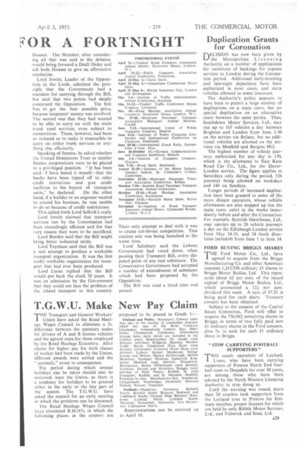FOR A FORTNIGHT
Page 31

If you've noticed an error in this article please click here to report it so we can fix it.
Houses. The Minister, after considering all that was said in the debates, would bring forward a Draft Order and ask both Houses to give an affirmative resolution.
Lord Jowitt, Leader of the Opposition in the Lords, admitted the principle that the Government had a mandate for carrying through the Bill, but said that two points had deeply concerned the Opposition. The first ryas to get the best possible price, because taxpayers' money was involved. The second was that they had wanted to be able to carry on with the main trunk road services, even subject to competition. These, however, had been so reduced as to make it impossible to carry on either trunk services or anything else efficiently.
Speaking of finance, he asked whether the United Dominions Trust or similar finance corporations were to be placed in a privileged position. "II has been said--I have heard it myself—that the banks have been tipped off to relax credit restrictions and give credit facilities to the buyers of transport
units," he declared. On the other hand, if a builder or an engineer wanted to extend his business, he was unable to do so because of credit restrictions.
This called forth Lord Selkirk's reply.
Lord Jowitt claimed that transport services run by the Commission had been exceedingly efficient and for that very reason they were to be sacrificed.
Lord Burden said that the Bill might bring bitter industrial strife.
Lord Teynham said that the Bill was a real attempt to produce a workable transport organization. It was the first really workable organization for transport that had ever been produced.
Lord Lucas replied that the Bill wouldput back the clock 30 years. It was an admission by the Government that they could not face the problem of the inland transport in this country. Their only attempt, to deal with it was to create cut-throat competition. This auction sale was being launched at the worst time.
Lord Salisbury said the Labour Government had voted down, when passing their Transport Bill, every disputed point of any real substance. The Conservative Government had accepted a' number of amendments of substance which had been proposed by the Opposition.
The Bill was read a third time and passed.




























































































